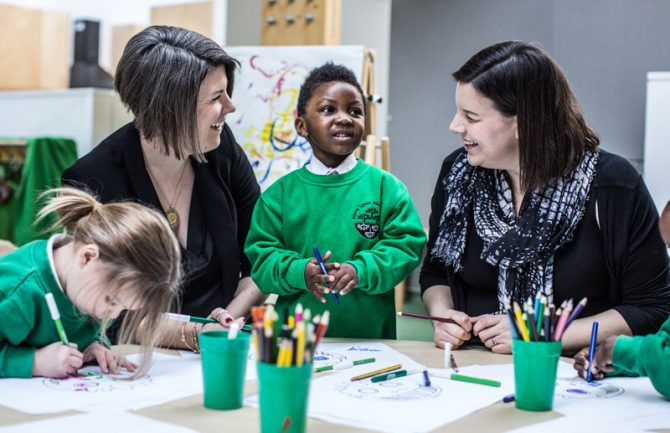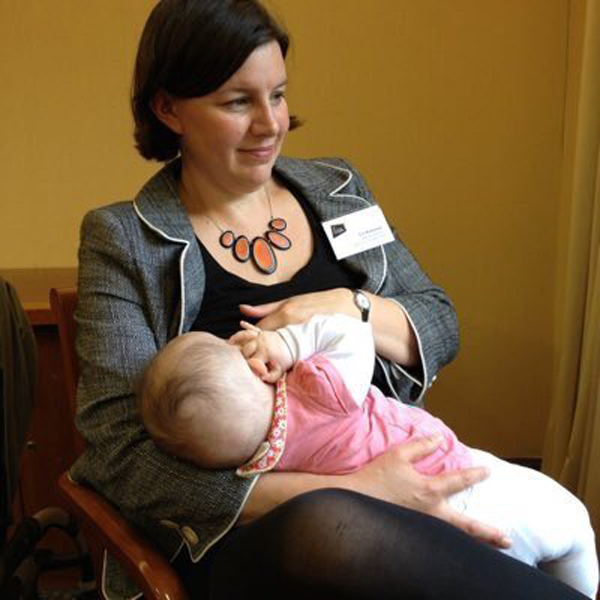Jess Staufenberg talks to one of the country’s youngest ever headteachers who then stayed put for almost 13 years
You get the feeling, talking to Liz Robinson, that were it not for her personal values she might have become a top-level Department for Education adviser or chief executive of an enormous multi-academy trust (only a handful of which are led by women).
At just 29 years old, Robinson landed her first headship at a south-east London primary school. It was 2006, funding was in abundance under New Labour, and the “education, education, education” mantra still echoed around Whitehall. Robinson was one of the first alumna of the government’s competitive “Fast Track Teaching” leadership programme to bag a headship. She was in magazines and people expected big things.
“I still meet people who say, ‘You were the Fast Track teacher’,” Robinson tells me, shaking her head in embarrassment. “I was on posters, every bit of Fast Track memorabilia. There was lots of hoo-ha. I ended up in Company magazine, something about women under 30 who’ve broken the rules – bizarre.”
For two years the London School of Economics philosophy graduate had taught at a primary school in north London before joining the Fast Track programme and then spending three years as a deputy head at another primary. During the programme, Robinson had been sent to “flashy conferences” and big residentials, met ministers and been coached in system-level thinking. Now, she wasn’t even 30 and she had a headship at Surrey Square primary school in Southwark, south London. It was such an unusual situation that, when she was later pregnant, it turned out the local authority didn’t have a maternity policy for heads because it hadn’t ever needed one before.

Robinson hoots as she recounts taking her parents to dinner to celebrate her new job and suggesting an impromptu drive down to the school at the end of the meal.
“It was very aesthetically challenging. You had to drive through an archway in a massive block of flats and the school was this big Victorian triple-decker with prison wire around the front wall. It looked like a poor-house from a Dickensian horror story. My parents were like, ‘Oh that’s lovely darling’, obviously thinking, ‘What is she doing’?”
The years that follow seem to reveal both Robinson’s particular character, and a different time for teaching, when “celebrity heads” didn’t build multi-academy trusts or have Twitter. She stayed. For almost 13 years.
My parents were like, “Oh that’s lovely darling”, obviously thinking, “What is she doing”?
After this stint, she is now co-director (note – not sole chief executive) at the Big Education multi-academy trust alongside the better-known Peter Hyman, a former strategist for Tony Blair. The trust is relatively young, with only three schools, including Surrey Square and the more media-renowned School 21. Robinson has turned down offers to take on other headships, more schools and new roles. Perhaps as a result (and also perhaps because of the shift in politics since 2010) she is not enormously well-known, with a modest Twitter following of around the 3,000 mark, and yet she is regarded by some as one of the best “progressive” school leaders of her generation. She baulks at using Ofsted judgments as a measure, but within three years of arriving she’d taken the school from a ‘good’ to an ‘outstanding’ judgment.

Robinson muses back to her first day. “If I had to name one of the school’s values when I arrived, it was smoking.” I splutter at this – smoking? “All the teachers smoked. The staffroom was at the top of the stairs, and the smoke would billow down, so you could smell it when you came in. It was like the oldest, rankest pub.”
It was a “joy” when the 2006 smoking ban indoors came in, she tells me, and to make it up to teachers she found money for a new staff room. Other clever financial decisions included selling off land to build a new nursery and securing funding for a “wonderful dining hall and kitchen, covered in grass”. Robinson is clear about the importance of architecture for schools. In a rare moment between self-effacing laughter, she notes that getting new buildings “was a profound thing to have done”.
Her other core focus was “values”, which for Robinson meant answering the question for staff and pupils, “how do we behave?”. “I wrote my values on five or six handwritten bits of card and stuck them on the wall in my office.” The values continue at the school to this day and have characters so young children can understand them: Percy for perseverance, Rafa for responsibility, Joy for enjoyment, Kofi for compassion and so on.
To explain the link to behaviour, Robinson tells me what she calls a “hallmark Liz story”. “A boy was brought into my office very early on by a teaching assistant. She sort of chucked him in and said, ‘This child doesn’t know how to behave’. And I thought, no, and neither do you. I think it is our job to teach these children how to behave, in the same way it is to teach them to read. The values became the backbone of our curriculum. It moved from a punitive, rules-based approach, to ‘these are the values we want you to show’.” Aiding Robinson in her efforts was her co-head, Nicola Noble, whom she describes as her “long-term professional collaborator” as a teacher at the school, and was appointed to the post in 2012.

In 2006, eight months after Robinson was first appointed, Ofsted inspectors said that “good standards of behaviour are achieved because adults strongly promote responsibility and respect” (although it should be noted inspectors graded behaviour as ‘good’ before her arrival, too). By the latest inspection report in 2016, behaviour was described as “exemplary”.
The focus on values is a lesson from Robinson’s own childhood. Her mother was from a Methodist family and the first in her family to go to university, and her father was Jewish and from an impoverished background, who suffered anti-semitism growing up. They were brought together by a shared commitment to serving others, explains Robinson: her father started a youth centre in Bromley, where she and her older sister were brought up, and her mother was an assistant director of children’s services. “It was a public service household. There was a powerful model of a working mum and deep values based around social justice.”
Yet as she describes the most recent decade, one gets the sense Robinson’s values have felt increasingly out of sync with those around her. I remark with surprise on the length of time she remained in her headship. “It is rare now. I’ve got very strong views on that. For good or ill in terms of my life and earning potential, I believe in doing things properly. I’m not interested in the quick wins or some of the bullshit that goes on.” Only co-constructing “deep-rooted” relationships with a community over a long period of time brings about positive change for children and families, says Robinson, who estimates that she was asked to take on about ten schools during her headship. “But I knew what turnaround takes. I hated that takeover MAT model, it was too much about quick wins. It’s the dick-swingingness about it, a kind of blokes’ club thing of ‘how big is yours?’.”

It rather feels like the ever-smiling Robinson is brave enough to say what many teachers think in private but fear stating too bluntly. She doesn’t air her views on Twitter, because it can become “quite toxic, and even though it’s not the real world, real influencers are created and exist there”. She is also utterly open about the fact one of the trust’s three schools, the International Academy Greenwich, is set to close this year because a permanent site was never found. “In all seriousness, it was the most distressing, disappointing and stressful thing I’ve dealt with professionally. I had to be the voicepiece of DfE messaging, and I got endlessly trolled on social media.” As a governor, Robinson is the only person from the school’s original founding team who has stayed.
Since leaving headship in 2018, she has now finally turned her full attention to wider system leadership. Robinson oversees the trust’s two-year Big Leadership Adventure programme “to train leaders as change-makers and disruptors”, as she puts it. The trust is also linked to spin-off charity Voice 21 which shares the oracy-focused model particularly promoted at School 21 across the UK. Robinson is taking her values out to the sector. Why now?
For good or ill in terms of my life and earning potential, I believe in doing things properly
“Why not shoot up the system sooner? I guess I didn’t want to be part of it. I was searching for the right vehicle to work in this way. The extent to which competition is embedded in the system means you have to have some sort of governance around the group of people you are working with, to get the traction you want.”
So did Robinson have to make a rare compromise on her values? She’s clear the Big Education Trust does not expect its leaders to follow a centralised curriculum and says above all she and Hyman want leaders who truly understand their communities to make the decisions.
Now, with the Big Education Trust approved to open two all-through schools in the next few years, Robinson has an exceptionally interesting time ahead of her. Perhaps, just perhaps, her values and the times are coming back together once more.














Your thoughts